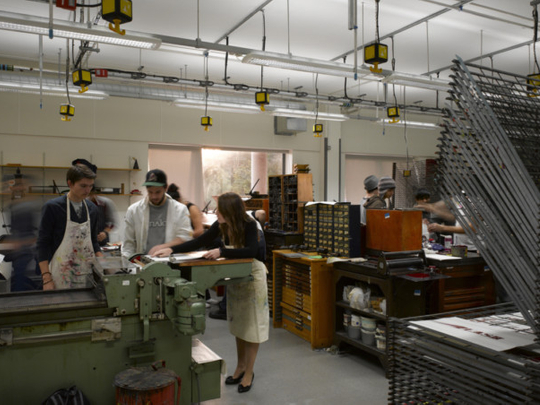
Curious minds must revel in how readily available knowledge has become in the 21st century. The world’s information now sits in the realm of near-total accessibility, but a debate continues about the effectiveness of the new mediums that have followed suit. Sal Khan, founder of the Khan Academy, a free and comprehensive US-based online school, reveals that one of the motivating factors since its inception has been teaching with video. He argues that it allows students to absorb material at their own pace — an observation, though astute, that cannot discount the added need for interactive instruction.
The web has become integral to all forms of teaching, online or not. Tests are taken, lectures are replayed, curriculums are made available and topics are discussed — all on online platforms, even if you are able to grab a coffee with your professor later on. Hence it only makes sense that today many qualifications can be attained remotely. So arises the question: is coffee the only thing you’re missing out on online?
Interaction is important
Professor Roy Batchelor is Course Director of Cass Business School Dubai’s Executive MBA. He stands on the purist side of the fence. “The student group brings a wealth of diverse business experience to their cohort. A lot of learning happens within the cohort in class, prompted by discussions with their professors and prompted by case studies.”
“In an online environment you don’t benefit from the knowledge, wisdom and experience of your fellow classmates. You also miss out on group work. While pure knowledge-based degrees, such as computer programming, are different, the point of business education is to help you solve problems that arise in the context of business,” says Batchelor.
“Many of these require persuasion and interaction with groups of individuals with different opinions. Learning to resolve these is not something you can simulate over the web. It is something that needs to be done live within a group, preferably facilitated by someone who understands group dynamics.
“If you are in a classroom or seminar room, you can leave the cares of the day behind you. There are fewer distractions. Some students are very efficient independent learners, but most people find it useful to have that break with their environment.”
So it would seem that a chat room is not a sufficiently intimate environment in which to learn. One can’t help but wonder if this is purely an aesthetic issue. Video interaction is possible for multiple participants simultaneously and in fact more easily recorded. Dr Kristian Sund is Principal Lecturer in strategic management at Middlesex University, which has online programmes as well as a Dubai campus. “I think it would be wrong to try and directly compare their effectiveness. Universities often act as social sanctuaries, where young people can feel free to develop and explore intellectually, away from the everyday constraints of families, jobs and so on. Having said this, there are situations where a student may find it impossible to regularly attend a university campus, and in those circumstances, there is no doubt that online education may be a solution,” he says.
“For example, Middlesex University delivers specialist MBAs to both the maritime and energy sectors. Both sectors are characterised by a high degree of global mobility, and executives find themselves travelling extensively. We have sea captains studying with us, as well as specialists on oil platforms. For such executives, regularly attending a MBA classroom is impossible, and the online MBA becomes an excellent alternative. I would never recommend doing an online MBA or undergraduate degree just because it’s more convenient than having to go to class. The full, physical university experience in my view is always going to be very valuable.”
Recognised and accepted
Commenting on the acceptance of online degrees in the job market, Sund says: “There is no reason to believe an online degree will not be recognised, as long as it is from a recognised university. I always recommend students to be very cautious of where they get their degree, as employers are no fools and view online degrees with great caution, especially if there is not a recognised university behind it.”
A valuable perspective can be gained from an institution that is relatively more vocational than conventional universities and offers online programmes. Arie van der Spek is the interim CEO and Directeur Général of the Glion Institute of Higher Education in Switzerland. The institute specialises in hospitality management courses and, hence, requires craft-based learning for some of its programmes.
“This is something you cannot teach or learn online. Craft-based learning, an important part of our academic approach, gives students the opportunity to experience the industry through practice in the kitchen or room divisions and helps them in developing skills such as communication, working under pressure, organisation and leadership,” says van der Spek.
Participating in a connected, global community (students, faculty or alumni) through video enhances the experience, he says. But video can be passive too and blended learning is preferred, where online education based on real-time experiences makes a larger network of resources available to students, who are sharing particular experiences.
“Online degrees are popular not just because of the flexibility and convenience they offer. Online education is about reaching out to groups of people who may not have had access to quality programmes before because of their location or other barriers. Online study offerings are extremely popular in countries where no top quality universities are available or travel restrictions or monitory restrictions apply,” says van der Spek. “They bring accessibility to high-quality lecturers and materials.”
There is less tuition to be paid, hundreds of online universities to choose from and millions of students are already enrolled in that big classroom in the sky. To quote Mark Twain, “I never let my schooling get in the way of my education”. School might not require you to explore the world, but perhaps an education does.












